Following in the footsteps of his father, a grocer from Nagpur is prepping to mount yet another anti-establishment Ganesh idol tableau that speaks truth to power
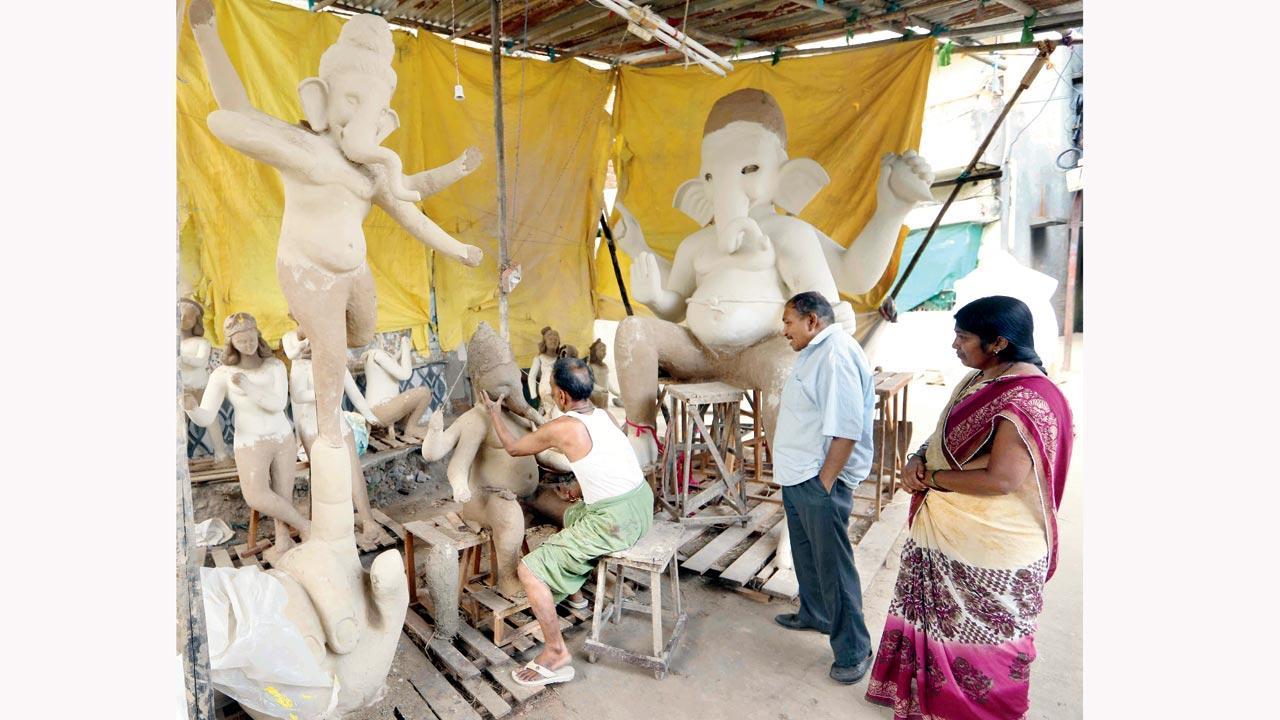
Chandrashekhar Puri and his wife Manisha seen visiting an idol-making workshop in Nagpur. The family works out of a new workshop every year, details of which are kept secret. Pic/Shekhar Soni
![]() Nagpur's Pachpaoli police station is on alert. City photographers are in “wait mode”. Neighbours and friends speak in hush-hush tones. An artist is at work, but in a space unspecified. It’s time for the annual Ganesh festival and the stage is set, as it has always been since 1959.
Nagpur's Pachpaoli police station is on alert. City photographers are in “wait mode”. Neighbours and friends speak in hush-hush tones. An artist is at work, but in a space unspecified. It’s time for the annual Ganesh festival and the stage is set, as it has always been since 1959.
ADVERTISEMENT
The Puri family of Nagpur mounts an attractive, but mostly controversial, Ganesh idol tableau. The showcase—a talk of the town (rather, of interest to the state)—presents Ganeshji with accompanying life-sized idols of real-life figures that evoke the mood of the moment. The choice naturally varies each year. It could be former chief minister Devendra Fadnavis embracing former rival Ajit Pawar; Prime Minister Modi at a G20 summit or even Rahul Gandhi touring the country afoot; Not to forget ISRO’s Chandrayaan mission, which offers a rather neutral non-controversial theme.
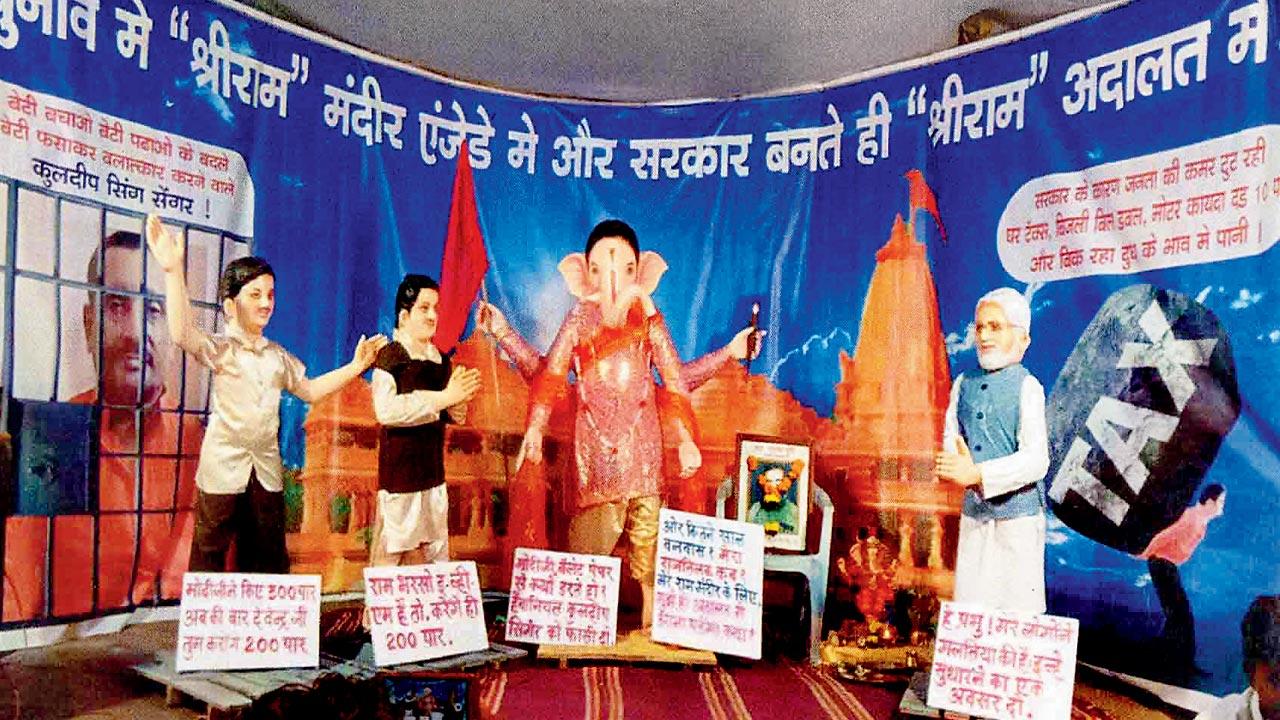 One of their recent tableaus dared to speak against the Modi administration’s duplicity over construction of Ram Mandir
One of their recent tableaus dared to speak against the Modi administration’s duplicity over construction of Ram Mandir
The idols, made under the Chandrashekhar Azad Bahuuddeshiya Mandal, are accompanied by slogans and banners, which take on the powers that be, consequences notwithstanding. The Puris have been frequently jailed for their public social comment, which allegedly disturbs social peace, during the Ganesh festival. As the festival begins this year, the idols will soon be unveiled from a secret workshop space—each year a new location, we are told. Only the artist, the Puri family, some anonymous well-wishers, and Bappa of course, are privy to the choice of the tableau. No persuasion can prompt the Puris to divulge the theme of the year.
“We derive immense joy from maintaining the secrecy of our annual creation. It is not that we are eager to attack an individual or group, but the Ganpati
festival is our chance to share our thoughts on the country’s current affairs. It’s a tradition, a practice, a ritual that we look forward to,” says 54-year-old Chandrashekhar Puri, son of late Gulab Maniram Puri, who initiated the tradition.
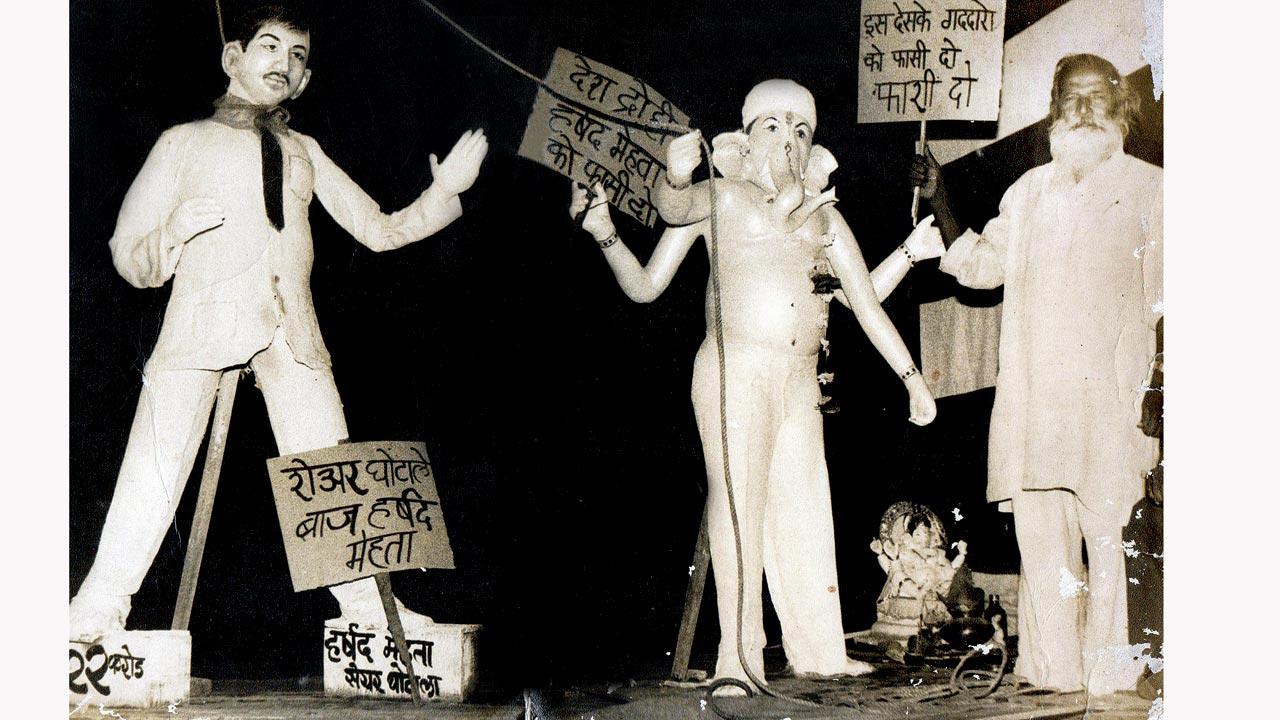 Late Gulab Maniram Puri (right), who initiated the tradition of mounting a tableau during Ganeshotsav, seen on stage with a Lord Ganesh idol calling for action against scamster Harshad Mehta
Late Gulab Maniram Puri (right), who initiated the tradition of mounting a tableau during Ganeshotsav, seen on stage with a Lord Ganesh idol calling for action against scamster Harshad Mehta
The Puris, members of the Gosavi nomadic tribes, have been in Nagpur’s Pachpaoli kumbharwada neighbourhood for over a century. Their modest ancestral house stands as a mute witness to the passage of years, unaffected by the urban makeover of Nagpur city. In Chandrashekhar Puri’s words, “We have been here much before the Pachpaoli flyover. We have even instituted the idol under the old bridge in the past.”
For the last few years, his sons Shivam and Rohan also help with the annual tableau, though they have other callings. The family, once extremely poor, has eked a living by selling vegetables and daily use items on a moving thela. While the thela is still a reality, the third generation Puris have taken to odd jobs, which keep them afloat.
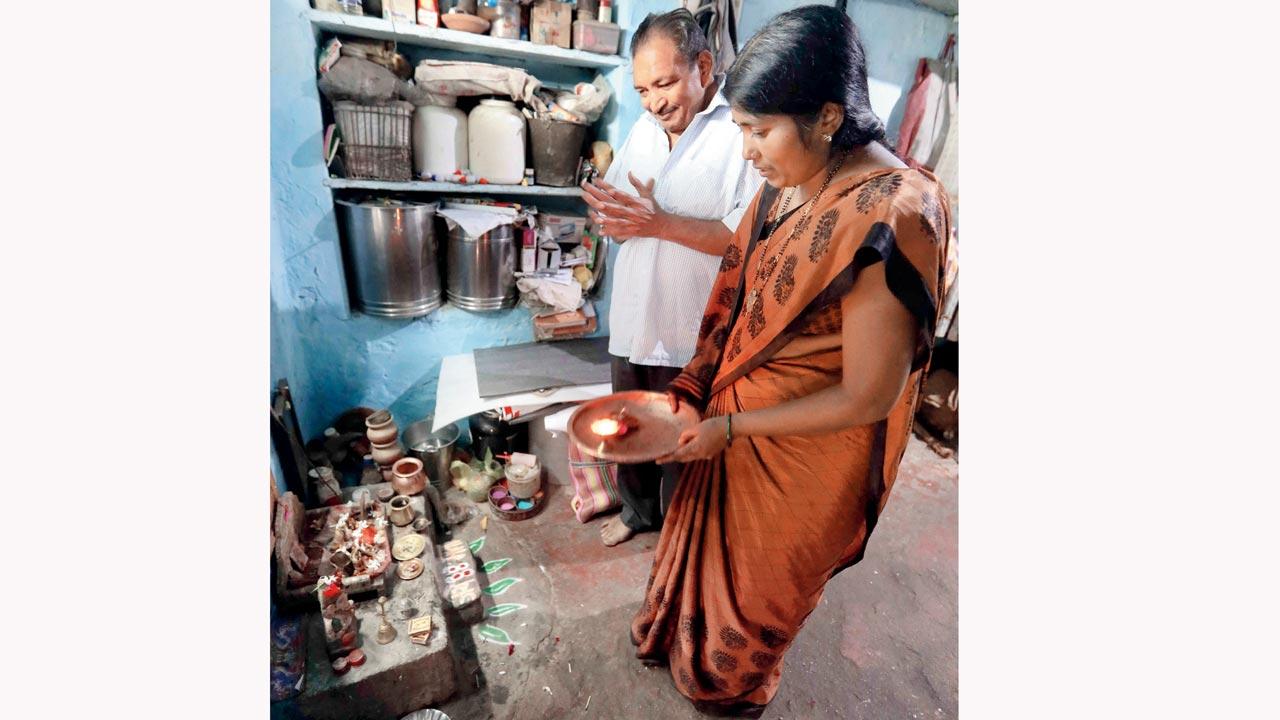 Chandrashekhar, 54, and Manisha doing Ganpati puja at their home
Chandrashekhar, 54, and Manisha doing Ganpati puja at their home
Over the years—irrespective of how much the day temperatures rise and which political outfit rules the municipal body, or how strict the post-pandemic protocols—the Puris remain an enigma during the Ganeshotsav.
Each year, only interrupted by the COVID pandemic in 2020, they surprise their audience with idols which question the status quo. In fact, they push the envelope by presenting the Ganpati idol in a human avatar—be it Atal Bihari Vajpayee, Bharatmata, a pagdi-wearing farmer, a masked common man, even a sitting judge in black robes. The “human” versions of Ganpati, along with the Puris, often land in Pachpaoli police custody at unearthly hours. The police declare the humanised idols as potential tools, which annihilate social peace. In fact, last year the court sustained an objection to the pant-shirt wearing Ganpati, which not just hurt public sentiments, but deviated from the popular notion of a Ganesh murti. Once, the senior Puri was arrested because the Ganesh idol was clothed with the Indian flag.
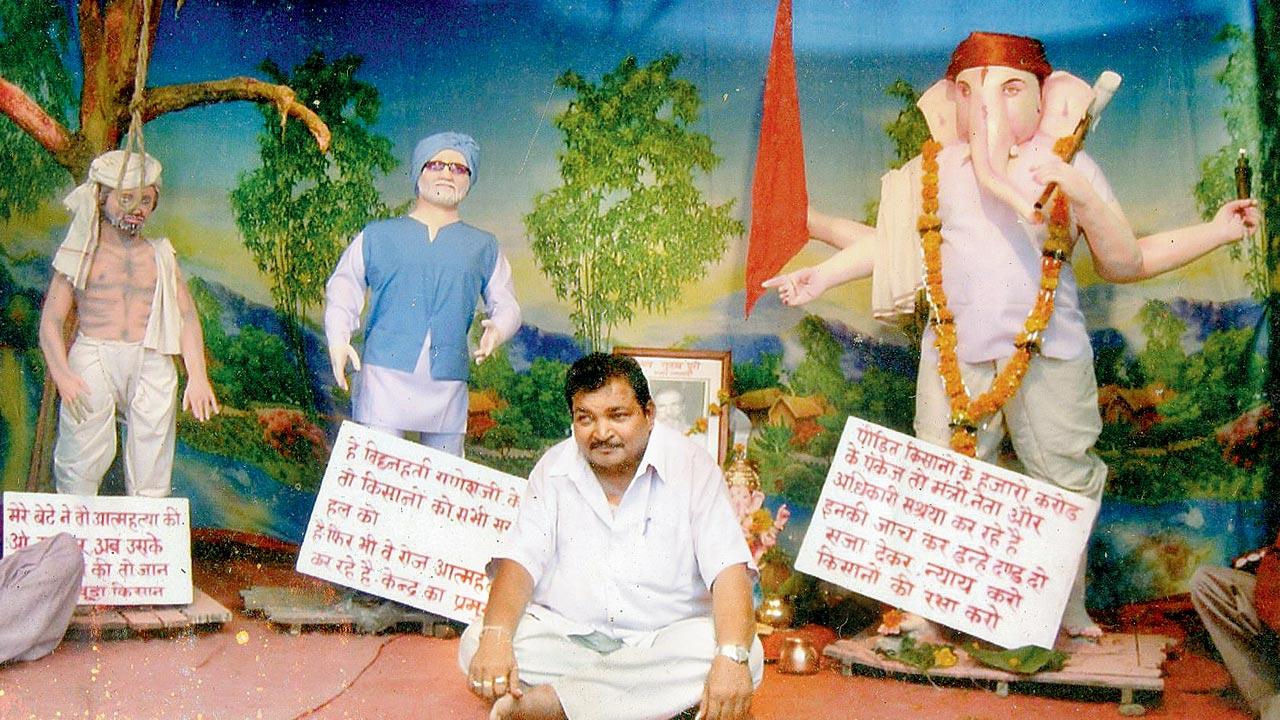 Chandrashekhar seated against one of his earlier creations: Reminding then prime minister Manmohan Singh about failed promises to farmers
Chandrashekhar seated against one of his earlier creations: Reminding then prime minister Manmohan Singh about failed promises to farmers
Many detractors also find the idols a bit gauche; some feel the idols do not sufficiently represent real-life personalities. Of course, Puris are unfazed by the critique of their aesthetic.
“Whether we agree with each version or not, the Puris present a spectacle every year. When the police arrive and the Puris are jailed, the people of Nagpur and the media is further treated to another show, the build-up for which is also exciting,” says Dr Satish Pawade, senior commentator and a theatre arts educator, who has followed the tableaus from Gulab Puri’s days. “Neither Gulab Puri, nor his son or grandsons, are artists or sculptors in the technical sense. But they have an eye for anomalies. They have a rather forthright and consistent signature style of articulation—posters, banners, placards—which evokes respect,” says Pawade.
Every year, the Puris start the ideation a little before the Ganpati festival season. As the director executing a scenario, Chandrashekhar Puri shuns his other work to witness the making of the dekhava; Gulab Puri even used to give finishing strokes to the clay figures. The family’s Hindi/Marathi copywriting skills are then put to use, usually amid interactions with select journos and legal experts. Banners and posters are the toppings on the creation—elements that raise the antenna of the Nagpur Police.
“I enjoy this season the most. We put aside household chores and invest our energies in voicing the most dominant themes of the year. The process is lovely. We draw inspiration from the great Lokmanya Tilak who used the Ganesh festival for public awareness,” says Chandrashekhar, who calls himself politically-neutral. His father took pride in the title “prakhar samajwadi”, and Chandrashekhar retains his connection with the Janata Dal (whatever is left of it) leadership in Nagpur. But the family is not politically aligned in the popular sense of the term.
The Puris have courageously commented on varied wrongdoers, perpetrators, and forces that shape contemporary India—scamsters like Harshad Mehta, perpetrators of crimes against women like Congress youth leader Sushil Sharma, political supremos who dictate rules to state chief ministers, celebrities like Sanjay Dutt who seek special treatment, BJP leaders who committed to the construction of an Ayodhya temple, not to forget Maharashtra’s rulers who pay lip service to the welfare of malnourished children in Melghat. The issue of separate Vidarbha statehood also reflects in the tableaus; especially naming local leaders who did not do their bit to realise the dream.
In 1994, the year after Gulab Puri’s death, the tableau featured Dawood Ibrahim Kaskar, the alleged mastermind of the Mumbai serial blasts. Way back in 1982, Gulab Puri erected the idol resembling former CM Babasaheb Bhosale, who was then charged with nepotism and other misconduct.
In order to avoid the police lock-up during the festival, the Puris are usually armed with a lawyer who argues their case of freedom of expression before the Nagpur bench of the Bombay High Court. The family filed a writ petition in 2005 seeking permission, which was applicable up to 2018, to install Ganesh and other idols along with the paraphernalia.
In an interim order, the court upheld the family’s right to do social-political messaging, as per the Article 19 of the Constitution of India. Later, when the court order was dismissed, the family again moved court and succeeded in getting another favourable ruling in 2021.
In the words of Ajit Adtani, the counsel who has represented the Puris in the past, the tableaus are not intended to hurt any ideology. They, however, provide a moment of reflection, an appeal to correct the blatant wrongs in the system.
Chandrashekhar Puri is a daily wage earner. He is not blessed with mentionable formal education. He doesn’t speak English. He does not post views on social media platforms. He doesn’t have friends in high places. He utilises his personal savings for the annual feature.
But he has one thing for sure—tremendous reserves of energy to integrate political messages with the Ganpati pooja season. It is his unwritten annual contract
with Bappa.
Sumedha Raikar-Mhatre is a culture columnist in search of the sub-text. You can reach her at sumedha.raikar@mid-day.com
 Subscribe today by clicking the link and stay updated with the latest news!" Click here!
Subscribe today by clicking the link and stay updated with the latest news!" Click here!







